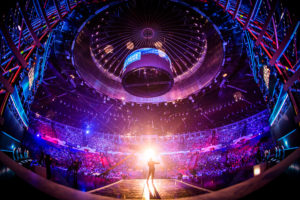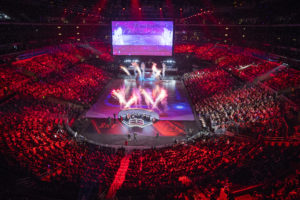In 2017, sports and esports intertwined to an unprecedented degree, multiple industry records were smashed, and the groundwork was laid for some of the most exciting developments in esports’ unfolding epic that we’ve seen yet. As a little Christmas present, here’s our nostalgia-soaked look back over the biggest stories from an incredible year in esports.
1 – The largest esports event in history

Intel & ESL welcomed 173,000 people in Katowice to the largest esports event on record.
Across two weekends of intense action in CS:GO, League of Legends, and StarCraft 2, a combined prize pool of $650,000 (£525,000) was up for grabs.
The audience were treated to masterclasses from Astralis, the Flash Wolves, and Jun “TY” Tae Yang, as the winners claimed the trophies and prize money in front of record attendance. IEM Katowice 2017 also commanded an online audience that was 35% higher than the previous year’s event.
“The gaming community’s passion for esports was on display,” said Frank Soqui, General Manager of the Virtual Reality and Gaming Group at Intel, adding that tournament “shattered all expectations”.
2 – The largest esports prize pool in history

Another record was shattered in 2017 – by Valve, who have made an awful habit of perennially rewriting the record books with the prize pool of Dota 2’s The International.
TI 7 featured the absolutely bonkers prize pool total of almost 24.8 million dollars (£18.6m). As a result, victors Team Liquid alone took home $10.9 million (£8.12m) alongside the Aegis of Champions.
As usual, the winnings were mostly funded by the fans, as players had the option to purchase a ‘Battle Pass’, which provides a suite of aesthetic enhancements for the game.
3 – Esports: franchised

North American esports took a massive step this year, with the NA LCS and the mostly US-based Overwatch League both offering franchise spots in their leagues commencing in 2018.
Riot Games revealed they were franchising their premier North American tournament in June, with slots reportedly selling for $10 million (£7.5m). Overwatch League franchises apparently paid twice that figure for inclusion in Blizzard’s competition. Many of this year’s stories followed the plights of esports organisations, sports clubs, and venture capitalists competing with each other for a space.
For a look into the twenty organisations behind the teams in both leagues, check out this handy OWL and NA LCS ownership guide. Spoiler alert: almost half of them have NBA affiliations!
4 – Tencent continues world domination

Not satisfied with simply owning the highest-earning game in the world, Tencent this year revealed a five-year plan to create a gargantuan, world-leading, $14.6 billion esports market in China.
The plan of action includes setting up further esports leagues, tournaments, and associations that will nurture players. Tencent will also construct esports ‘industrial parks’, providing an upgrade to the infrastructure across the country’s entire esports ecosystem.
They definitely have the bark to back up their bite, too, having announced a total annual revenue of $21 billion for 2016. That figure was reached with the assistance of an acquisition of League of Legends developer Riot Games the previous year.
5 – Esports discussed for the Olympics
 Just when you thought you’d heard it all, news came out this year that the virtues of esports are being debated by the International Olympic Committee, with a view to a potential inclusion in the 2024 Games.
Just when you thought you’d heard it all, news came out this year that the virtues of esports are being debated by the International Olympic Committee, with a view to a potential inclusion in the 2024 Games.
The team behind the Paris bid for the 2024 Games were keen to discuss the possible addition to the programme with the IOC, with the aim of appealing to some of the legions of (typically young) fans of esports tournaments.
The 28th of October saw leading representatives of the Olympic Summit weigh up the pros and cons of esports. They acknowledged that esports “could be considered a sporting activity”, a crucial first step if the bid to include esports is successful; however, they also outlined a number of requirements that would have to be met, including the formation of an independent governing body for competition. If you’re interested in all facets of the debate, check out this piece, which runs through the arguments for and against esports’ inclusion.
So, there you have it: five of the biggest stories of 2017. Of course, it doesn’t come close to truly encapsulating a momentous year of esports, and there will doubtless be countless stories that could have just as easily slotted in lieu of the ones above. But that just demonstrates what a storied year this has been for competitive gaming – and esports is only going up from here.
Happy holidays, and see you all in 2018. I can’t wait to find out what’s in store.

